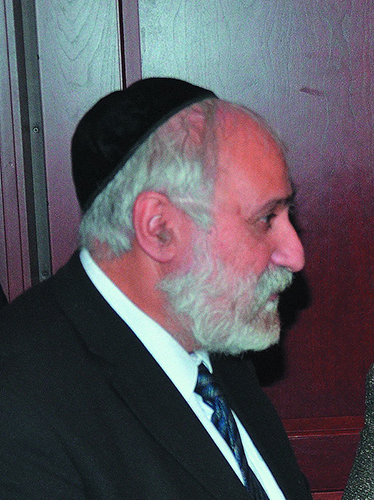
As the Knesset voted for a draft law that affected haredi men in Israel, thousands to protest in the streets. At Netzach Yehuda, a Nahal Haredi battalion in Judea and Samaria, Israel Defense Forces Commander in Chief, Lt. Gen. Benny Gantz visited with haredi soldiers. of the “Everyone needs to serve in the army,” he said. “The IDF allows a religious soldier to remain religious, a haredi soldier to remain haredi and a secular soldier to remain secular.” The general came to praise the success of the soldiers, all of whom enlisted voluntarily, and suggested that each encourage a minyan of men to volunteer.
“Precisely because we have proved in the battalion that haredi men can serve in the army by consent, recent events have been twice as painful to us and the soldiers,” said Rabbi Yitzchak Bar-Haim, founder of the brigade, and mentions the increasing number of awards soldiers in the brigade receive and their notable achievements.
Taking effect in 2017, the law eliminates the automatic military exemption for full time yeshiva students. Some exemptions will continue: 1000 “especially gifted” students will be exempt; 2000 others will be required to do national service. The law has engendered strong negative reaction from haredi and Sephardi representatives. The three year delay effectively grants an exemption to some 30,000 current yeshiva students. Additional exemptions will be given to students who remain in Yeshiva until age 24.
When Prime Minister David Ben Gurion initiated yeshiva exemptions, hundreds were affected. But in 2014, there are close to 30,000 men studying in haredi yeshivos in Israel. Positions are strongly held on every side: some haredi rabbis are advising students to ignore draft notices that will be issued in 2016; Uri Regev, CEO of Hiddush, says the legislation hands yeshiva students “large-scale exemptions.” Others tell their students, who have been ordered to register, to speak only Yiddish and refuse to answer questions. One such student, the father of three, has already been arrested.
MK Nisim Zee’v, of Shas, has a son who learned in yeshiva and served three years in the IDF. “Nobody pushed him,” the MK told JLBC in a phone interview from Washington. Ze’ev does not support the current law, but does support the participation of haredim the IDF.
“The way the law in the Knesset is written is a big mistake,” he said. “All the yeshiva boys who feel they don’t want to continue learning go to the army.” In the main, he said, “They want to be part of the regular society, but, need special accommodations in the army, specifically those provided by the Netzach Yehuda Brigade.”
The approximately 800 brigade members maintain davening and learning daily. “They are keeping all their mitzvot. But,” he added, “you can’t force boys who are really learning to go to the army and tell them they have to go to jail. You can’t bring them by force.”
JLBC asked the MK to estimate how many studying in yeshivas will be the next generation of teachers and rabbis. He said, “The boys learning in the yeshiva are not learning to be teachers They are learning because they believe in learning Torah.”
JLBC asked why these students have the right to be full time learners, when others cannot. Should their right to study be any more protected than that of others who want to follow their passions? Shouldn’t everyone be similarly obligated to do national service or join the IDF?
Ze’ev noted that army service is generally for 18-24 year olds. “After 24, they are free. Most of the yeshiva boys are learning, not because they don’t want to go to the army, but because they believe in the Torah. They learn only learning because they believe. After they get married, most go to the army for two years. All the boys who are not learning go to the army. The army needs 5200 volunteers by 2017. Now there are almost 3200. According to MK Ze’ev, “they can reach that number.”
The MK acknowledged some haredim could be fraudulently taking advantage of the exemption “but most are learning.” He strongly stated that “the heads of the yeshivot are not keeping boys who are not learning. They kick them out right away, if the Roshei Yeshiva feel a student is not serious,and is just fooling around. Not because of the army, but because they don’t want a boy who is playing games. Those boys go to the army right away.”
Ze’ev says General Gantz’s visit to the Netzach Yehuda brigade was “a good thing,” reiterating that forcing boys that believe in learning to go to the army is not a good thing. He spoke about the Tal Law, saying “it opened the door for all of them. Some want to learn; usually about 20 to 30% of the boys want to go to the army. Some have to go to work to bring parnassa. There is a practical aspect as well.” But, he emphasized, “We don’t need the law. It is a big mistake.”
The direction of the Supreme Court was to make the Tal Law permanent, not to make new law. It simply needed additional resources. Resources were made available after the army recognized that the law was working.
An observant American serving in the IDF blogged that “the (Israeli) army is full of Orthodox Jewish men and women, who carry weapons and undergo the same training and day to day life as any other soldier.” He says there is ample time for prayer, delicious Glatt kosher food and ample time for study. “The entire army,” he says, “must observe all Jewish holidays and dietary laws. This is a Jewish army.” says the young soldier. “The army of the Jewish state. Religion is priority number one.”
By Maxine Dovere










